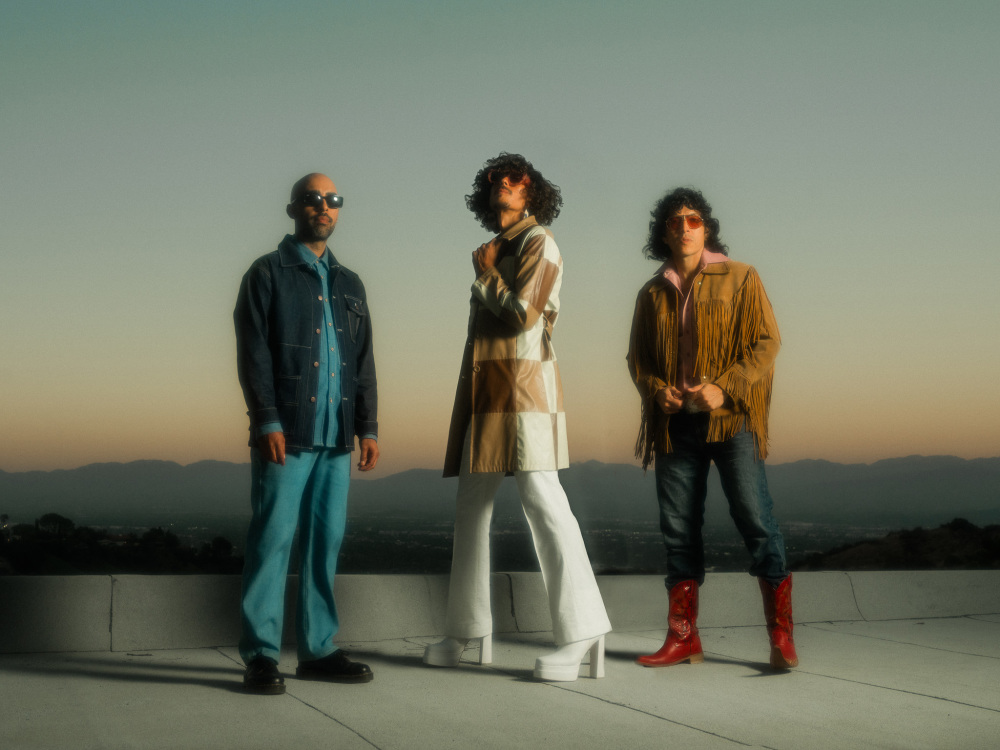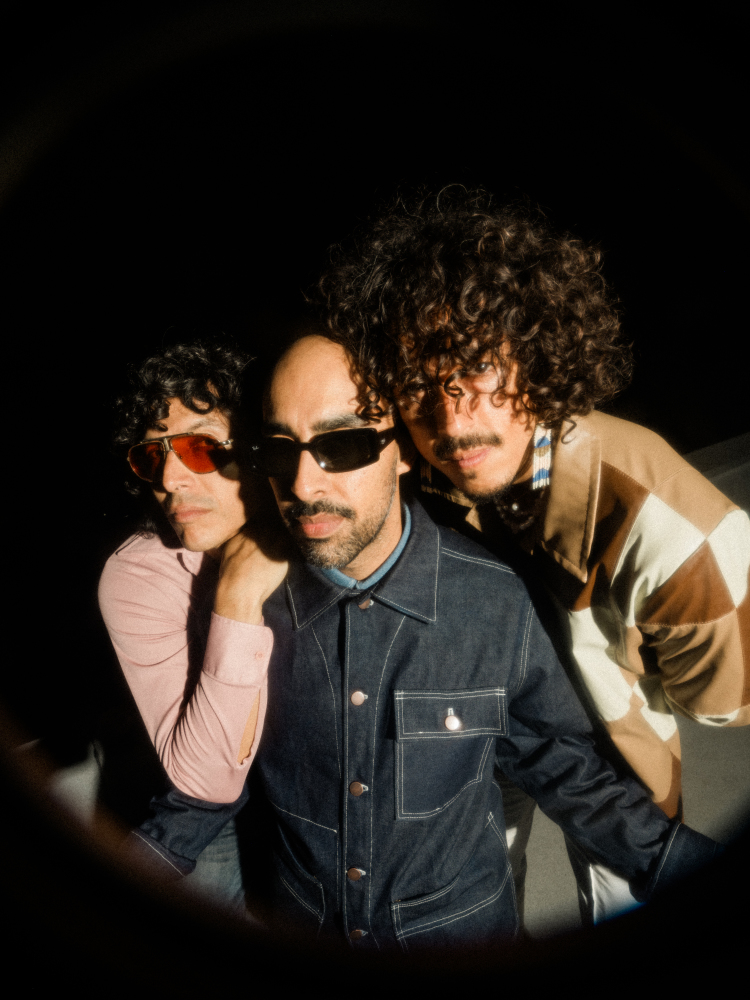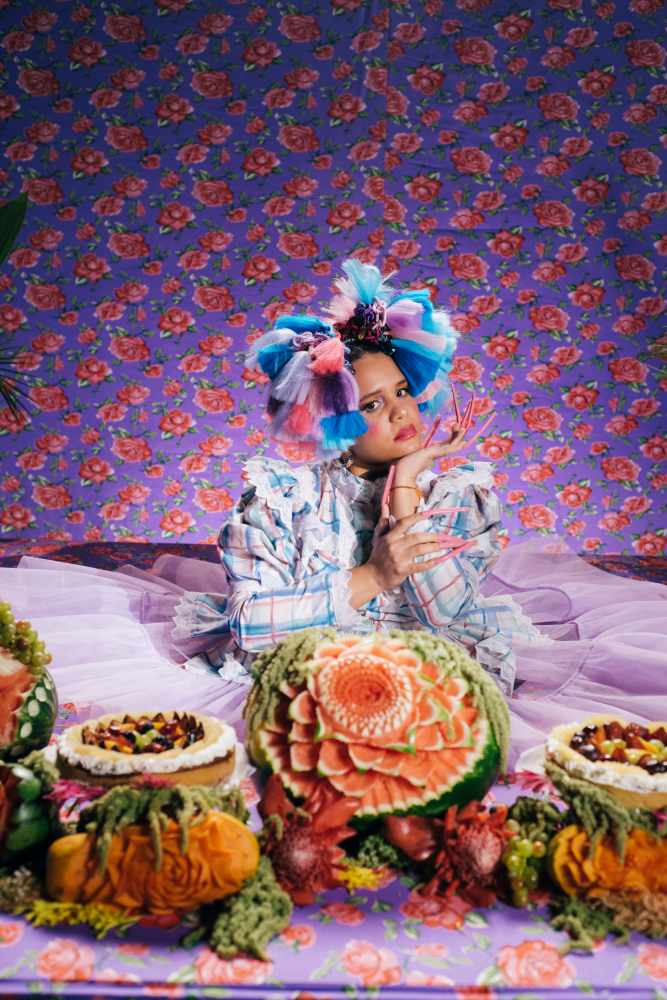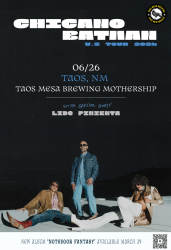Chicano Batman
W/ Lido Pimienta
FOR ONLINE CUSTOMER TICKETING sales and support contact support@holdmyticket.com or call 1-877-466-3404.
IN-PERSON WALK-UP SALES ONLY for all shows are available at the Mothership location on day of show only, depending on availability.
ALL SALES ARE FINAL. RAIN OR SHINE EVENT. NO REFUNDS.
NO DOGS OR PETS ALLOWED.
NO OUTSIDE FOOD OR DRINK
VENUE INFO: Taos Mesa Brewing Company Mothership Stage
Seating: Limited
ADA: Yes
Welcome to a night of musical enchantment at the Taos Mesa Brewing Mothership! Join us on June 26th as we present the dynamic sounds of Chicano Batman with special guest Lido Pimienta on our Mothership stage. Chicano Batman's fifth album, Notebook Fantasy, takes you on a journey through vibrant musical landscapes, from arena-ready anthems to psychedelic space odysseys. With a fearless approach to creativity and a commitment to honesty, Chicano Batman's performance promises an unforgettable experience. Joining them is the multidisciplinary artist Lido Pimienta, whose work delves into themes of gender, race, and diasporas, offering a unique and powerful perspective. Don't miss this extraordinary night of music and artistry. Get your tickets now and be part of the magic!

Chicano Batman
The fifth album from Chicano Batman, Notebook Fantasy takes its title from a phenomenon likely familiar to anyone who feels outside the status quo: the act of spending your formative years dreaming up other worlds and realities in the pages of a notebook, exploring those possibilities with a bold and wide-eyed freedom. Throughout the lifespan of the Los Angeles-bred band, vocalist/lyricist Bardo, guitarist Carlos Arévalo, and bassist Eduardo Arenas have followed their own visionary impulses to tremendous heights—a journey that began with taking the stage at local dive bars and recently saw them co-headlining the legendary Hollywood Bowl. In the making of Notebook Fantasy, Chicano Batman doubled down on their hyper-creative tendencies, discovering new dimensions of their prismatic musicality while infusing their lyrics with an unflinching honesty. With its dizzying constellation of song forms and sounds—including everything from arena-ready anthems to piano-driven balladry to psychedelic space odysseys—the result is a body of work that sheds all inhibitions and fully reveals the sublime expanse of their musical imagination.
Produced by John Congleton (St. Vincent, Erykah Badu) and partly recorded at the historic Sunset Sound, Notebook Fantasy veers away from the subtler sensibilities of 2020’s Invisible People and embraces a sonic approach Arenas refers to as “painting in primary colors.” “We wanted to peel back all the fuzziness and compression, and create something big and punchy and clear that would still hold up if you stripped it down to just a vocal and one instrument,” says Arévalo. “Over the years we’ve all gotten better at executing a vision; we understand how to use our musicianship and instrumentation and energy more deliberately so we can make the music we want to hear, and we’re open to working with other people to make that happen,” adds Bardo. To that end, Chicano Batman enlisted more than a dozen guest musicians on Notebook Fantasy, such as esteemed string arranger Jherek Bischoff (Angel Olsen, Regina Spektor). “Playing with all those seasoned musicians really helped us to level up, and when I listen now there’s so many cool moments within the songs—to me it’s one of those records you can keep going back to and hear something you never noticed before,” says Arévalo. “In a lot of ways this album is us realizing our potential, and getting to that point meant we all had to trust each other and let each other do our thing.”

As the band explains, building that trust and receptivity required a total overhaul of their musical process. “In the past we’d butt heads trying to filter each song through our individual style or aesthetic—there was a lot of, ‘You brought this song in, but I’m now going to do my thing on it,’” says Arévalo. “This time we allowed whoever started the track to direct the process, and the rest of us were there to bring their vision to life in the way that best served the song.” Their most truly collaborative work yet, Notebook Fantasy wholly reflects all the joy and pain and much-needed catharsis that went into its creation. “My feeling is that if we’re having fun making a song, the audience will pick up on that and have fun too,” says Arenas. “But before we could have fun we had to let go of a lot of old resentments and have some difficult conversations.”
The first duet in Chicano Batman history, a standout track called “Parallels” arose from a series of writing sessions where Bardo and Arenas worked out those grievances in real time. “Eduardo would come over to my house and we’d talk for hours about all our misgivings, all the stuff we’ve been holding onto from the past, and then we’d put it all into the lyrics,” Bardo recalls. “It was this crazy back-and-forth where we were completely scathing with each other, and it turned out to be kind of revolutionary for us.” “I remember pacing around at Bardo’s place, coming up with lyrics and telling him, ‘Just go for it, man—hit me where it hurts,’” Arenas continues. “And some of those lines did hurt, but we needed them to. That’s the depths we had to go to for this record.” Initially sparked from a voice memo recorded by Arenas on his three-year-old son’s detuned guitar, “Parallels” eventually morphed into a shapeshifting epic graced with cinematic strings, choir-like harmonies, and a bit of gorgeously sprawling guitar improvisation from Arévalo—a glowing example of Chicano Batman’s newly heightened mastery of their songwriting and sound.
All throughout Notebook Fantasy, Chicano Batman channel moments of lightning-in-a-bottle inspiration into songs that push into fantastically strange terrain yet remain rooted in raw emotion. Born from a chord progression composed by Arévalo while practicing guitar and bolstered by lyrics and vocals from Bardo, the album-opening “Live Today” emerges as an empowered meditation on cutting through the chaos and finding your own version of peace, building a gloriously bombastic mood with its slinky grooves and otherworldly synth. One of the album’s most purely euphoric tracks, “Fly” begins with a guitar hook by Arévalo that was developed during a session revisiting music he began on a Prophet 6 synthesizer. The finished version swells into a lovestruck reverie lit up in gauzy textures and heavenly group vocals. And on “Era Primavera,” Chicano Batman share a symphonic love song inspired by Bardo’s fascination with mid-century Spanish-language ballads, adorning the track with a swooning string section and soaring background harmonies supplied by Martha González of the influential Chicano rock group Quetzal with her son and two of his cousins, transforming “Era Primavera” into a multigenerational family affair with an indelibly poignant impact. “I wrote that song thinking about a past relationship, and about all those romantic ballads that I heard growing up because of my parents,” says Bardo. “It’s the music we all loved together, and I still feel very emotionally connected to it now.”
Another song closely informed by Bardo’s upbringing, “Lei Lá” began as a cumbia experiment played in reverse on a Tascam 244 four-track tape machine in Arenas’ basement. Later, at Sunset Sound, the band achieved a potent synergy by feverishly blending elements of cumbia and dancehall and ’70s-era Nigerian funk, while Bardo delved deep into his Afro-Colombian roots and brought a distinctly sensual, spiritual, and jovial ethos to the track’s lyrical component. A full-tilt dance party in song form, “Lei Lá” reaches a mind-bending ecstasy in its final moments, happily falling out of rhythm and landing in its own enchanted universe. “My mom’s from Cartagena and she’s 63-year-old now, but she dances with this incredible energy like you’ve never seen before—she’s a live wire,” says Bardo. “With ‘Lei Lá’ I was thinking about being onstage and bringing that same energy, so that everyone can feel the electricity.”

Thanks in part to a live show that routinely leaves audiences elated and spellbound, Chicano Batman have experienced a major growth in their fanbase since the release of Invisible People. With their latest triumphs including a headlining spot at L.A.’s iconic Forum in summer 2024, the band’s massive appeal has much to do with a rare balance of boundless charisma and hard-won understanding of the nuances of showmanship. “I remember playing to about 10 people at a bar on a Monday night when we first started out, but we just kept working and growing everything from the ground up,” says Arévalo, who joined Chicano Batman in 2011 after Bardo and Arenas co-founded the band in 2008. “Now we’re at the point where we can look out at the audience at the Hollywood Bowl and see people who’ve been fans for 15 years, and they’re there with their kids who are fans now too. It’s become a generational thing, which feels really magical.”
For Chicano Batman, the live set served as an essential touchstone throughout the making of Notebook Fantasy. “I always want everyone to scream their hearts out at our shows, so one of the main ideas behind this record was, ‘Let’s write songs that speak about love and pain in a very direct way that you can immediately feel in your soul,’” says Bardo. When matched with their refusal to dilute the diversity and magnitude of their sound, that approach ultimately led the band toward the truest expression of their one-of-a-kind voice. “Making this album allowed us to stop reaching toward anything besides being completely ourselves,” Arenas says. “We believe we have something unique to speak to the world, so we focused on getting that across with confidence and conviction instead of worrying about any outside noise. We want to be so untouchable that no one can take our shine away, and hopefully that’ll help other people to shine too.”

Lido Pimienta es una artista multidisciplinaria, crítica y curadora de arte, compositora y productora musical de origen Wayuu y Afro Colombiana, que reside en Toronto, Canadá. Pimienta lleva en los escenarios y exhibiendo su trabajo artístico desde el 2022, y en el presente hace su debut como anfitriona, escritora y creadora del show de televisión, LIDO TV. El trabajo y mensaje de Pimienta se centra en las politicas de genero, raza, maternidades e identidades desde un lente feminista y migrante enfocada en diasporas y vernacular Sudamericana.
Lido Pimienta es un referente artístico internacional. Su punto de vista y resistencia a las normas que se imponen en la sociedad y en especial a las mujeres racializadas en la escena musical e industrias creativas. Con humor, irreverencia y sensibilidad en su voz y su canciones desgarradoramente reales, Lido Pimienta demuestra que se puede existir en dichas escenas comerciales e independientes en armonía, sin tener que renunciar a cierta dignidad y genuinidad propia.
_____
Lido Pimienta is a multidisciplinary visual artist, art critic and curator. She is a composer and musical producer of Afro Indigenous(Wayuu) Ancestry from Colombia.
Pimienta resides in Toronto Canada, and has been performing live and exhibiting her work worldwide since 2010. She was the first female of colour to ever compose and original score for the New York City Ballet Orchestra and is also the first ever black and indigenous woman to be debuting as a TV host, writer and creator of a network show in Canada, LIDO TV; a variety show that explores themes like Feminism, Colonialism and Success, with a hilarious twists and the help of puppets. Pimienta’s music and visual work navigates politics of gender, race, motherhood and the construct of the Canadian Landscape in the South American diaspora and vernacular.
Lido Pimienta aims to create a sense of belonging and strength through diversity. Diversity as a feeling and Diversity as a verb. Born and raised in the Caribbean North Coast of Colombia, she draws and creates portraits of the familiar faces found in big crowds going about their day in a beautifully synchronized chaos of the places she calls home. These compositions all exist in what Pimienta calls CARIBE SUBLIME, in which she identifies the Caribbean coast of Colombia and peoples from African diasporas, their cultures and identities, not as exotic but Sublime.
An international artistic referent in her own right, Pimienta’s point of view and resistance to follow trends or participate in a narrative that demands racialized women to be a trope, has earned Pimienta a loyal following in both the mainstream and artistic arenas. With humor, irreverence and the tenderness that comes from her singing voice, Pimienta has positioned herself as a true Renaissance Woman.

